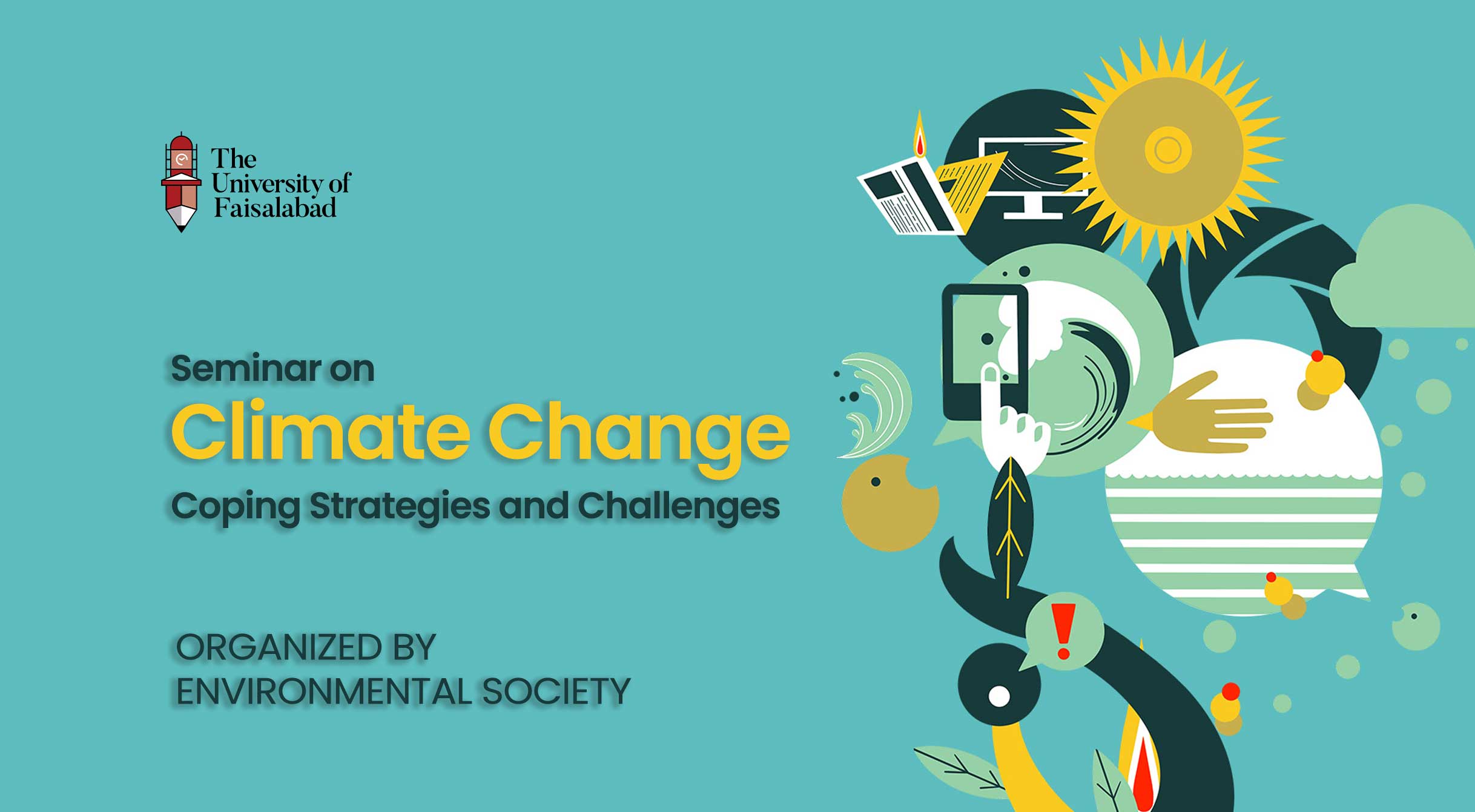Environmental Society Hosts Seminar on Climate Change: Coping Strategies and Challenges
Introduction
The Environmental Society recently organized a compelling seminar titled “Climate Change: Coping Strategies and Challenges.” In today’s world, where climate-related events are becoming increasingly frequent and severe, such discussions are crucial. This seminar brought together experts, students, and environmental enthusiasts to explore actionable solutions to the pressing issue of climate change.
Understanding Climate Change
Definition and Global Perspective
Climate change refers to long-term alterations in temperature and weather patterns, primarily caused by human activities such as burning fossil fuels, deforestation, and industrial processes. Its global impact includes rising sea levels, more frequent extreme weather events, and disruption of ecosystems.
Climate Change Challenges in Pakistan
For Pakistan, climate change poses real and immediate threats. From severe flooding in urban areas to prolonged droughts affecting agriculture, the country faces multifaceted environmental challenges. Understanding these local implications was a key focus of the seminar.
About the Environmental Society
Who They Are
The Environmental Society is a student-led organization dedicated to promoting awareness, sustainable practices, and environmental stewardship within the university and surrounding communities.
Their Mission and Objectives
The society aims to inspire students to take proactive steps in environmental conservation, encourage sustainable campus initiatives, and foster partnerships that address local and global environmental issues.
Event Overview
Date, Venue, and Format
The seminar was held in the university auditorium, featuring panel discussions, interactive sessions, and audience engagement activities. It was designed not only to educate but also to motivate participants to take action.
Key Participants
The event featured distinguished panelists, including environmental experts, policymakers, and academics. The session was moderated by a senior faculty member, ensuring a smooth flow of discussions.
Distinguished Panelists
Experts and Moderators
The panel consisted of specialists in environmental engineering, sustainable development, and policy advocacy. Their insights provided a comprehensive view of climate change challenges and solutions.
Their Contributions
Each panelist shared experiences and practical approaches to tackle climate change, emphasizing both technological solutions and community-driven strategies.
Major Themes Discussed
- Sustainable Practices — Encouraging daily eco-friendly habits and institutional policies that reduce environmental footprints.
- Collective Responsibility — Highlighting the need for combined efforts from individuals, communities, and governments.
- Policy and Governance Approaches — Emphasizing strong environmental regulations and long-term planning.
Coping Strategies Presented
Technological Adaptation
Panelists discussed renewable energy sources like solar and wind power, efficient waste management, and innovative technologies to reduce carbon emissions.
Green Infrastructure
Implementing climate-resilient urban planning, building sustainable infrastructure, and improving water management systems were highlighted as essential strategies.
Community-Based Resilience
Empowering local communities through education, awareness campaigns, and participatory decision-making ensures long-term resilience against climate impacts.
Challenges Highlighted
- Economic and Financial Barriers: Limited funding and resources can hinder environmental initiatives.
- Political and Regulatory Hurdles: Inconsistent policies and weak governance may obstruct sustainable practices.
- Lack of Social Awareness and Education: Public understanding of climate change remains inadequate, limiting community engagement.
Interactive Session
Student Participation
The seminar encouraged students to ask questions, share ideas, and engage in discussions, making the session highly interactive and participatory.
Key Takeaways
Participants emphasized the importance of personal responsibility, informed decision-making, and collaborative efforts in combating climate change.
Impact on Students and Community
Learning Outcomes
Students gained insights into practical coping strategies, policy considerations, and the role of technology and community action in environmental protection.
Campus Initiatives
The seminar inspired plans for tree-planting drives, energy conservation projects, and student-led awareness campaigns, strengthening the university’s commitment to sustainability.
Broader Importance of Seminars
Raising Environmental Awareness
Such seminars foster a culture of environmental consciousness, motivating students and faculty to take actionable steps.
Bridging Academia and Policy
By connecting students with experts and policymakers, the event demonstrated the importance of integrating academic knowledge with practical solutions.
Encouraging Collaboration
Collaboration between students, faculty, and industry stakeholders creates a strong foundation for innovative climate solutions.
Link to Sustainable Development Goals (SDGs)
- SDG-13 (Climate Action): Promotes awareness and action on climate issues.
- SDG-17 (Partnerships for the Goals): Highlights the importance of multi-stakeholder collaboration.
Future Plans of the Environmental Society
The society plans to host more seminars, workshops, and awareness campaigns. Student-led green projects and collaborations with industry and community organizations are also on the agenda to further promote environmental sustainability.
Conclusion
The seminar on “Climate Change: Coping Strategies and Challenges” successfully highlighted both the urgency of the issue and practical approaches to tackle it. By combining expert insights, student engagement, and actionable strategies, the Environmental Society demonstrated how educational institutions can play a pivotal role in addressing climate change. The event inspired attendees to take personal, collective, and policy-driven action toward a more sustainable future.
This aligns closely with SDG-15: Life on Land, which emphasizes protecting, restoring, and promoting sustainable use of terrestrial ecosystems — a goal that underpins many of the green infrastructure and community-based resilience strategies discussed at the seminar.
FAQs
- What was the purpose of the seminar?
The seminar aimed to discuss climate change challenges and propose coping strategies for effective environmental management. - Who were the key speakers at the event?
The seminar included environmental experts, policymakers, and university faculty members who shared insights on sustainable solutions. - Which coping strategies for climate change were discussed?
Strategies included technological adaptation, green infrastructure, and community-based resilience initiatives. - How can students participate in future events?
Students can join the Environmental Society, volunteer for green projects, or contribute to seminars, workshops, and awareness campaigns.
Why is policy engagement important in tackling climate change?
Policies provide the framework for sustainable practices, ensure compliance, and enable the scaling of effective solutions.

